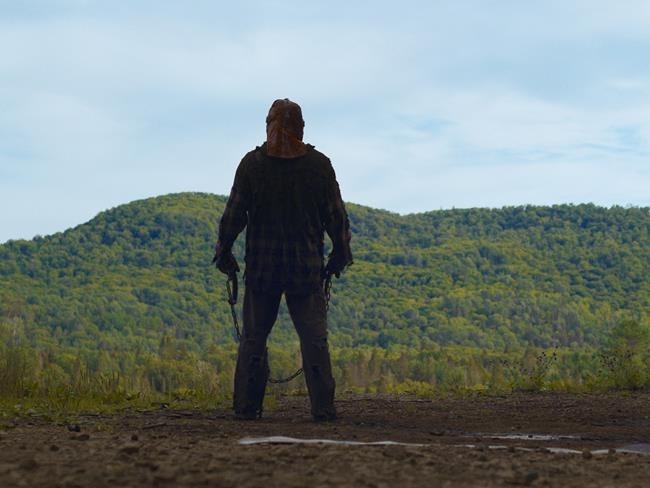
An image from the film "In A Violent Nature" is shown undated handout photo. Canadian director Chris Nash says the rugged wilds of northern Ontario are a main character in his Sundance horror film, "In A Violent Nature." The ambient slasher follows Johnny, an unforgiving, undead monster, as he trudges through the woods and systematically slaughters a group of camping teens who stole a locket from his resting grounds. THE CANADIAN PRESS/HO
January 20, 2024 - 1:00 AM
Canadian director Chris Nash says the rugged wilds of northern Ontario are a main character in his Sundance horror film, "In A Violent Nature."
The ambient slasher follows Johnny, an unforgiving, undead monster, as he trudges through the woods and systematically slaughters a group of camping teens who stole a locket from his resting grounds.
"In A Violent Nature,” which is set to debut Monday in the Midnight program of the Sundance Film Festival, has no protagonists. Everything is shown from Johnny’s perspective. But Nash says the film’s eerie, arboreal setting — shot in the Algoma District near Sault Ste. Marie, Ont. — is just as much of a menace as the killer himself.
“There's no musical score, so the actual sounds of nature surround the audience when they're watching the film,” Nash says from his Airbnb in Park City, Utah.
“It was paramount for us that we feel like we're in the woods at all points in time, and that we get this feeling that we are isolated in a very expansive area, where you almost feel the threat of being alone in the woods by itself, without a big, old monster man with an axe hunting you down.”
When Nash and his crew began shooting in 2021, they originally settled on the Kawartha Lakes area but ended up hitting pause because the area “just felt like it wasn't hitting the right note for us,” says the 42-year-old, who was born in Sault Ste. Marie.
They ultimately decided to restart the production in the Algoma region.
“We realized just how important the surrounding nature itself, and the type of flora around, was to the film.”
Nash notes 1977 cult Canadian horror film "Rituals," directed by Peter Carter and starring Hal Holbrook, was shot in the same area.
"In A Violent Nature" is among several projects with Canadian ties premiering at Sundance. Other films debuting at the Park City festival include the Winnipeg-shot “Winner,” about a whistleblower who exposed Russia’s hacking of the 2016 U.S. election, and "Sugarcane," a documentary that investigates the history of an Indigenous residential school in British Columbia.
Nash's film has already secured theatrical and streaming distribution with IFC and Shudder, which the director says "takes a lot off your plate" as far as feeling the need to shop his movie around.
Parallels can be made between “In A Violent Nature” and another Canadian Shudder film: 2022’s “Skinamarink.” Like Kyle Edward Ball’s critically lauded horror film, Nash’s slasher is an immersive, slow-burning experience.
“In A Violent Nature” employs several familiar horror tropes — from a masked killer to bloody axe murders — but flips them on their head by injecting elements of slow cinema into the genre. Instead of jump scares, the camera shadows Johnny as he advances with a quiet and deliberate creep towards his victims. Then, we see him slay his targets — using everything from hand saws to wood chippers — in a long, methodical, excruciatingly gory manner. The murder scenes are drawn out — like watching blood dry.
“I think tropes are great, but they're so often used in the wrong way,” says Nash. “What they definitely did for us was create a shorthand for us to deliver information to an audience, where we don't have to delve deep into any kind of backstory.”
Johnny’s victims have very little dialogue, but just enough that the audience registers their archetypes: the girl next door, the jerk boyfriend, the class clown.
"Being able to communicate who these characters are very, very quickly frees up time for us to develop other aspects of the film. We can really hone in on the tone, the style, the cinematography and the overall ambience that we're presenting.”
Nash was inspired by Gus Van Sant’s “death trilogy” of films — 2002’s “Gerry,” 2003’s “Elephant” and 2005’s “Last Days” — which “are just slower, more methodical, more deliberate and follow characters through a scene.” He wanted to approach a slasher with that same type of execution.
The director says he’s noticed a slow cinema movement developing in the horror genre.
"I don't know where it's coming from, but there definitely seems to be a bit of a tone shift,” he says.
He notes that in “creepypastas” — a catch-all term for horror-related content that’s been copied and pasted around the internet — he’s been noticing more “liminal spaces videos where there's nothing necessarily happening. There are no jumpscares. The environment itself is the horror that you're living in.”
While not much happens in the videos he speaks of, a lot is happening in Nash's life. He’s described his last few days at Sundance as “a whirlwind.”
"I have no idea what impact this is going to have on me or my career," he says.
"I think it's great that it's happening now. If I was 25 and this happened, I would burn out so quickly."
Nash looks forward to connecting with other filmmakers over the next week, but he doesn't foresee himself partying too hard at the festival, which runs through Jan. 28.
"Sleep is great," he says. "Waking up early is amazing."
This report by The Canadian Press was first published Jan. 20, 2024.
News from © The Canadian Press, 2024